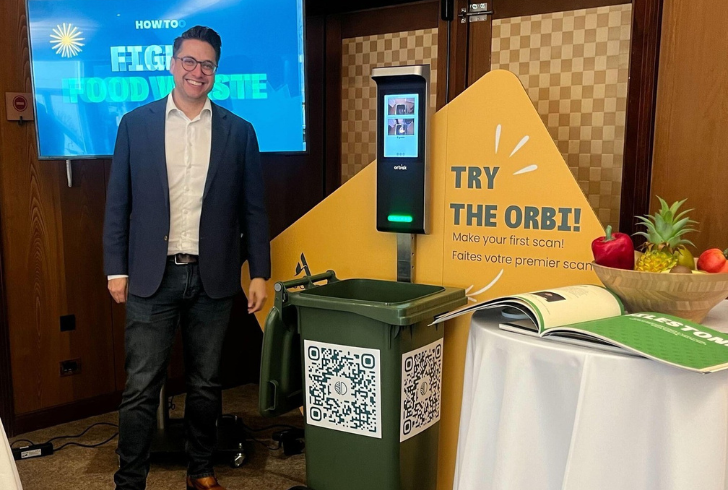Food waste in the United States amounts to nearly 60 million tons annually. The hospitality sector produces a large share of it, especially in high-volume kitchens. Hotels, restaurants, and cruise lines often prepare food for unpredictable crowds. This leads to extra prep, spoilage, and ingredients thrown away.
Orbisk’s arrival in the U.S. brings a practical tool that helps kitchens track and cut this waste with real-time data. After achieving strong results with Accor, Hyatt, and Carnival Cruise Line, the company is now implementing its system across major foodservice operations nationwide.
Orbisk’s Technology and How It Works

Instagram | orbisk_zero_food_waste | The Orbi device uses AI to seamlessly track kitchen food waste by item and weight.
Orbisk’s platform centers around a device called “Orbi,” a plug-and-play system built to streamline food waste tracking in professional kitchens. The unit uses AI-driven image recognition to identify and weigh more than 800 ingredients as soon as items are discarded. No manual entry is required, and the device fits easily into existing kitchen workflows.
The data flows into a straightforward dashboard that provides teams with immediate visibility into what is being wasted and why. Instead of relying on guesswork or inconsistent logs, culinary staff gain a reliable view of patterns such as:
1. Overproduction during peak service
2. Spoilage due to storage habits
3. Items frequently trimmed or discarded
These insights help kitchens adjust prep routines, refine ordering, and anticipate demand with greater accuracy. The system’s goal is simple: reduce unnecessary waste and help operations run more efficiently.
Why the U.S. Launch Matters
The scale of food waste in the U.S. makes the expansion significant. Preventable waste carries environmental and financial consequences, especially for sectors that manage high-volume production every day. Applying automated tracking in professional kitchens creates an opportunity to shift long-standing practices toward more sustainable methods.
Orbisk’s move into the U.S. follows strong results abroad. Partners such as Accor, Hyatt, and Carnival Cruise Line have already reported measurable reductions in waste and smoother kitchen operations. The technology aligns with the growing push for sustainability across the hospitality industry, where businesses are seeking tools that support both cost control and environmental responsibility.
Where the Technology Is Being Deployed
Orbisk is rolling out its system to restaurants, hotels, cruise lines, and other foodservice locations that generate large quantities of waste. The company’s international footprint — nearly 1,000 systems in use worldwide — has built a foundation for wider adoption in key U.S. cities.
The focus is on high-volume operations where even small shifts in behavior can produce major savings. Kitchens that serve buffets, banquets, and continuous service are among the prime candidates for early adoption.
The Start of Orbisk’s U.S. Expansion
Orbisk officially began its U.S. launch on November 13, 2025. The rollout follows several international pilot phases and targeted research into the needs of American foodservice operations.
The expansion was strengthened by the company’s collaboration with Carnival Cruise Line. Earlier in the year, Orbisk developed an AI model specifically tailored for cruise ship conditions, including a motion-resistant system that maintains accuracy even during rough seas.
Carnival’s adoption of this model improved alignment between food prep and per-person demand by 17%, helping reduce overproduction on board.
How Orbisk Supports Kitchen Efficiency
The platform does more than log waste. Its AI-Powered Actions feature reviews recurring patterns and offers suggestions that help teams adjust their routines. These actions appear directly in each site’s dashboard, guiding kitchen managers toward changes such as adjusting batch sizes or modifying storage methods.
This makes the information not just useful, but applicable to everyday decisions. As kitchens respond to these insights, they often see smoother workflows, better cost control, and improved consistency.
Waste Reduction and Cost Savings

Instagram \ orbisk_zero_food_waste | Orbisk helps kitchens cut food waste to boost sustainability and meet SDG 12.
Sites using Orbisk around the world have reported annual waste reductions of up to 10,000 kilograms — about 22,000 pounds per location. Depending on the size and output of the kitchen, savings can reach up to €65,000 per year.
Because the U.S. handles such large volumes of food, even partial adoption across the industry could significantly reduce national waste levels. The technology provides an accessible path for kitchens seeking to enhance sustainability without compromising productivity.
Commitment to Sustainability
Orbisk supports global sustainability goals, including the United Nations’ Sustainable Development Goal 12, which focuses on responsible consumption and production. Reducing food waste helps save resources and cuts the strain on landfills. It also lowers the environmental impact created by busy commercial kitchens.
As the U.S. hospitality sector reviews long-standing routines, many teams look for tools that guide them toward more efficient production. Orbisk’s system offers that support by simplifying waste tracking and helping kitchens make faster, data-based decisions.
Orbisk’s arrival in the U.S. introduces a direct way to address one of hospitality’s biggest issues. The platform uses AI tracking and clear insights to help professional kitchens reduce waste in real time. As hotels, restaurants, and cruise lines continue to use the technology, they can cut food waste, control costs, and move toward long-term sustainability goals.




